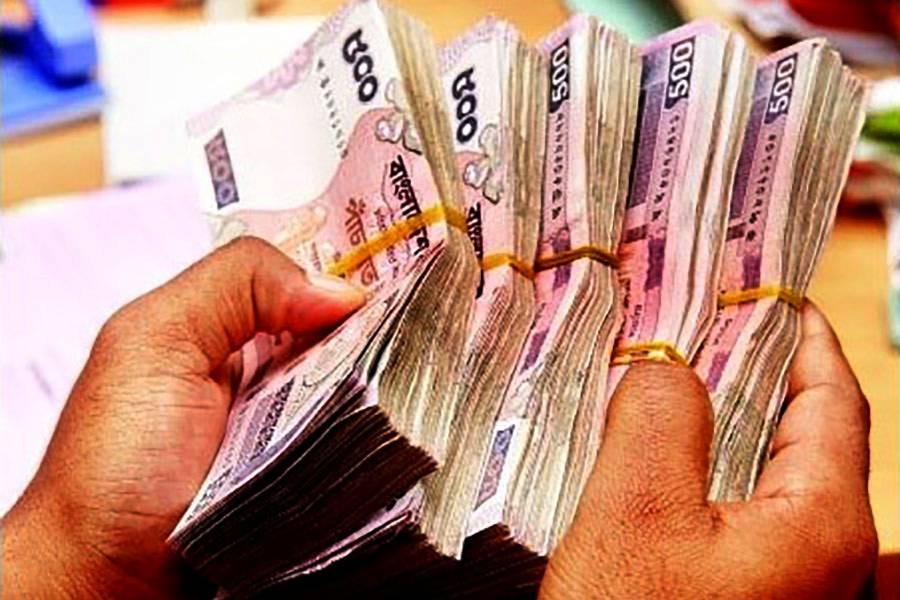The surplus liquidity in the banking system might fuel inflationary pressure in the country in the near future, the Bangladesh Bank (BB) has said in its just-published annual report for the fiscal year 2019-20.
"Excess liquidity stemming from the stimulus packages may engender inflationary bubbles in the periods ahead, hence strong vigilance would be required," said the central bank in the report.
The BB's observations came against the backdrop of rising trend in excess liquidity in the country's banking sector in recent months following lower private sector credit growth.
Banks' excess cash hit all-time high of nearly Tk 2.0 trillion in November last following lower private sector credit growth, caused by supply chain disruptions amid the ongoing coronavirus pandemic, according to bankers and experts.
Expansionary monetary policy coupled with the implementation of the government's stimulus packages have driven up liquidity in the banking system, they explained.
They expressed the fear of inflationary pressure if the excess liquidity is used for unproductive or less-productive sectors.
"The central bank should strengthen its monitoring and supervision for the implementation of the government's stimulus packages properly so that it can't exert inflationary pressure on the economy," Mustafa K. Mujeri, executive director of the Institute for Inclusive Finance and Development (InM), told the FE on Wednesday.
Dr. Mujeri, a former chief economist at the BB, also said the banks should execute the financial packages in line with the central bank's directives to minimise risks.
"Exceptionally high liquidity is a burden for the banks," Emranul Huq, managing director (MD) and chief executive officer (CEO) of Dhaka Bank Limited, told the FE.
The senior banker also said it will hurt the profitability of the banks should the excess liquidity persist in the near future.
"Lower credit demand, particularly from the private sector due to the ongoing pandemic, has pushed up the amount of excess liquidity in the banking system," Mr. Huq said.
BB, however, is hopeful about tolerable inflation level, thanks to adequate domestic food grains production as well as the fall in international commodity and fuel prices.
Considering these, the central bank has projected an average inflation range of 5.0-5.9 per cent for the current fiscal year, near to the government's target of 5.4.
Meanwhile, the country's 12-month average inflation as measured by consumer-price index (CPI) rose to 5.69 per cent in December 2020 from 5.59 a year before. It was 5.73 per cent in November 2020.
"We're watching the overall price situation closely to keep the inflation rate within the 6.0 per cent band by the end of this fiscal year," a BB senior official told the FE.
He also said the central bank has already recommended the policy makers monitor the domestic price development to curb the possible inflationary pressure.
Regarding economic activities, the central bank said there have been signs of improvement with regard to health issues and economic recovery.
However, the subsequent spells of the pandemic are still feared to pose serious risks to the economy, it warned.
On the external front, global recession, oil price volatility, and trade wars may slow down the domestic recovery, according to the report.
Floods that occurred in different parts of the country are identified as downside risks by the BB, saying that livelihood or economic activities, functioning of local markets, crops, livestock and fisheries have been severely affected, creating downside risks for the growth outlook.
The government has set the target of real GDP (gross domestic product) growth at 8.2 per cent for FY'21.
Although the target appears to be ambitious, it is achievable considering that the Covid-19 related situation will improve and the economy will rebound strongly following a V-shaped recovery path, aided by the successful and timely implementation of the stimulus packages, the central bank noted.
The government has so far announced a total of 23 stimulus packages worth Tk 1.24 trillion to offset the shock of Covid-19 pandemic in various sectors of the country.


